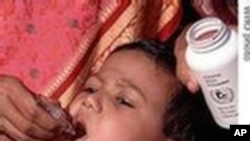<!-- IMAGE -->According to the latest Bangladesh Demographic and Health Survey, only 51% of Bangladeshi women see a medically trained provider at least once during their pregnancy. The United States government, through the United States Agency for International Development, or USAID, is working with the government of Bangladesh to improve the health of newborns and their mothers through a new health initiative called "MAMONI."
The U.S. will provide $13.5 million for the initiative in the Sylhet district of Bangladesh. The project aims to address the high death rates among women and infants in the district through improved outreach by field workers, increased education for safe pregnancy and delivery, and improved family planning and child spacing. The Bangladesh Minister of Health, Dr. A.F.M Ruhul Haque announced the project jointly with U.S. Ambassador to Bangladesh James Moriarty at an event in Sylhet on August 4th.
The MAMONI Project will increase pregnancy related care, support safe delivery, and increase community involvement in caring for pregnant women, including active involvement by men. The program will also organize emergency transport for pregnant women in labor.
MAMONI will work to increase awareness and use of proven, low cost methods for saving newborns and will provide education on the use of family planning to protect the lives of women and children. In all, MAMONI will work in 15 upazilas [sub-districts] and reach out to some 3.5 million people.
Through USAID, the United States government is making a difference in improving the lives of the people of Bangladesh, and in particular, the poor. USAID's work in Bangladesh comprises 5 broad areas: improving health and pre-primary education, creating income opportunities for rural poor, supporting good governance at all levels, enhancing food security, and strengthening disaster preparedness and providing emergency assistance following natural disasters.
The United States government has provided over $5 billion in assistance to Bangladesh since 1971. In 2009, USAID's planned assistance will total about $172 million, including specific assistance for people living regions affected by Cyclone Sidr. The U.S. remains committed to working with the government of Bangladesh to promote the health and prosperity of the people of Bangladesh.
The U.S. will provide $13.5 million for the initiative in the Sylhet district of Bangladesh. The project aims to address the high death rates among women and infants in the district through improved outreach by field workers, increased education for safe pregnancy and delivery, and improved family planning and child spacing. The Bangladesh Minister of Health, Dr. A.F.M Ruhul Haque announced the project jointly with U.S. Ambassador to Bangladesh James Moriarty at an event in Sylhet on August 4th.
The MAMONI Project will increase pregnancy related care, support safe delivery, and increase community involvement in caring for pregnant women, including active involvement by men. The program will also organize emergency transport for pregnant women in labor.
MAMONI will work to increase awareness and use of proven, low cost methods for saving newborns and will provide education on the use of family planning to protect the lives of women and children. In all, MAMONI will work in 15 upazilas [sub-districts] and reach out to some 3.5 million people.
Through USAID, the United States government is making a difference in improving the lives of the people of Bangladesh, and in particular, the poor. USAID's work in Bangladesh comprises 5 broad areas: improving health and pre-primary education, creating income opportunities for rural poor, supporting good governance at all levels, enhancing food security, and strengthening disaster preparedness and providing emergency assistance following natural disasters.
The United States government has provided over $5 billion in assistance to Bangladesh since 1971. In 2009, USAID's planned assistance will total about $172 million, including specific assistance for people living regions affected by Cyclone Sidr. The U.S. remains committed to working with the government of Bangladesh to promote the health and prosperity of the people of Bangladesh.




